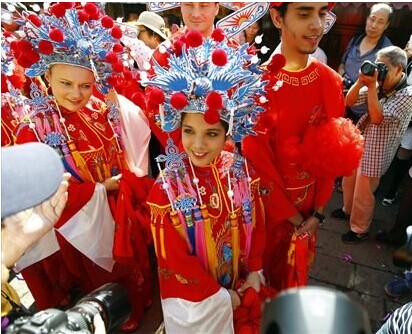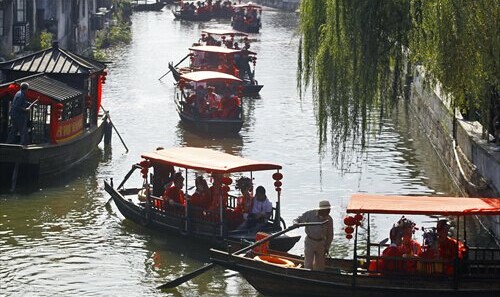| Home > Living In China |
Expat brides and grooms enjoy a taste of tradition

Ten small wooden boats glided along the river as fireworks echoed around them. Clad in ornate red Chinese wedding costumes, 20 couples, mostly foreigners, waved cheerfully to the people on the banks as they cruised past.
This was Sunday in Fengjing town in Jinshan district, where a special group wedding ceremony was celebrated in the traditional local style. Brides and grooms from 15 countries took part in - half of the couples were Chinese men or Chinese women marrying foreigners and the other half were expatriates.
This was the 10th year that the town had staged a group wedding, said Wang Wei, a wedding ceremony official. Previously most participants were Shanghainese couples. "This year we made it specifically for foreign couples, as nowadays expats are more interested and involved in traditional Chinese culture and customs."
That was why Aqil Zidan, 22, chose to experience this wedding ceremony with his bride. The young Indian came to China in 2013 and is studying at Nantong University in Jiangsu Province. There he met and fell in love with Saara Nakale, a 21-year-old Namibian. One of Zidan's Chinese friends suggested they get married in this traditional ceremony and the couple agreed.
For the day Zidan wore a long gown, a red hat with two "wings," and an artificial flower the size of a football. For Zidan it was very strange attire. "My hat is very heavy but my wife's is much heavier," he said, indicating Nakale's hat which was decorated with pearls and pompons. This was a fengguan (a phoenix crown). "They are heavy but very beautiful."
Red veils
At about 10:30 am, after getting off the boats and walking in a procession through the small streets of the town, the brides and grooms were led to an outdoor stage. One by one, they went to the center of the stage aided by a woman dressed as meipo (a woman matchmaker) and a man dressed as yuelao (the god of matchmaking in Chinese mythology). To applause and cheers, the grooms slowly raised red veils from their brides' faces. Later the couples hung "lovelocks" on a plastic heart-shaped tree.
Director Wang explained that Chinese people believed that by hanging "lovelocks" during the wedding, couples will stick with each other and live happy lives forever.
For 30-year-old Chinese woman, Xiong Yan, the wedding day was a surprise and a delight. "I had always dreamed of a traditional Chinese wedding ceremony," she said. "I am really excited today to be wearing such a beautiful red wedding dress."
Xiong's husband, Cervinka Ales from the Czech Republic, had signed them up for this ceremony some months beforehand but he did not tell her. "I know that she loves traditional things a lot, so I planned to give her a surprise," he smiled.
A name puzzle
Some of the expat brides and grooms were puzzled by the names of the Chinese wedding dishes. The names of the "eight dishes" - the wedding banquet for the 20 couples - each had a special meaning.
The first course, braised pork leg with soy sauce, was called "rising up, step by step." Wang said this wished the couples an infinitely bright future. The last course of braised eggs in sauce was called "from generation to generation."
As well as the "eight dishes" each couple drank a small bowl of lotus seeds soup - older Chinese believe that by eating lotus seeds, newlyweds will produce babies early.
In Fengjing town there is a private wedding museum, which has more than 300 exhibits including a 100-year-old carved wooden wedding bed and some exquisite wedding dresses.
In the old days in China on her wedding day a bride would be sat in a sedan chair and carried to her husband's home. But in Fengjing, a water town, brides were taken to their new homes in boats.

Custom
 more
more




 print
print  email
email  Favorite
Favorite  Transtlate
Transtlate 







